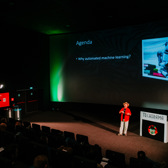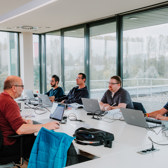Developing Microservices with Containers, Kubernetes and Microsoft Azure
UAMIC
3 days
Interested in a private company training? Request it here.
Containers
What is this Container-thing developers are talking about? And why should you use it? In this module you will get an overview of what containers are, and how to use them on Windows and Linux.
- Why Containers?
- Containers vs Virtual Machines
- Linux and Windows Containers
- Container Orchestration
Docker
A container needs to be hosted and run on a container runtime. Several options are available like rkt, runC, ... In this course, our emphasis will be on the most widely used one: Docker. You will learn how to create, run, and scale containers using Docker.
- Running Docker
- Containers, Images and Registries
- Building an Image
- Port Mapping and Volumes
- Container Orchestration
- LAB: Simple node.js in Docker
Developing ASP.NET Applications with Containers
Now that you understand what a container is, the next question is: how do you package your applications into containers? In this module, you'll learn how to Dockerize your ASP.NET applications, and how to run and debug them.
- ASP.NET or ASP.NET Core?
- Official .NET Docker Images
- Containerizing Dependencies
- Tools
- LAB: File Uploader
Azure for Container Overview
Azure has many constructs that have to do with containers and microservices. It's a bit overwhelming, really. This module will help you separate the sheep from the goats, to figure out exactly what you need.
- Azure Container Registry
- Hosting Containers: Container Instances, AKS, Service Fabric, ACA
- Deploy with Containers: Web Apps and Functions
Microservice Architecture
How do you chop your application into multiple smaller components, called "microservices", and why would you do that? Here, we will show you how to create microservice-applications and introduce you to some key concepts of microservices like data isolation, resiliency, and communication.
- Dealing with Evolution in an Application
- Benefits and Drawbacks
- Scaling
- Communication: Client-Service, Service-Service, Event-Based
- Data Isolation per Microservice
Kubernetes
When employing containers for microservices, you'll inevitably have numerous containers spread across multiple machines. Kubernetes emerges as an open-source solution for managing your infrastructure. In this module, we delve into this widely adopted orchestrator.
- Kubernetes Cluster
- Kubectl and YAML
- Workloads: Pods and Deployments
- Communication: Services and Ingresses
- Scaling and Updates
- Health Monitoring
- LAB: Set up your first Kubernetes Cluster
Azure Kubernetes Service (AKS)
Once you've developed your microservice application, the next step is deploying it to the cloud. Azure provides various methods for this purpose, but Azure Kubernetes Service (AKS) offers the most comprehensive options. In this module, you'll become a master of Azure Kubernetes Service.
- Putting a Kubernetes Cluster in Azure
- AKS Features
- Using Helm Charts
- LAB: Using Kubernetes on Azure
Azure Container Apps
Managing scalable containers on a Kubernetes cluster in Azure, but without the complexity. Sounds like a dream? It's not, this is exactly what Azure Container Apps are all about. In this module you will learn how to set up a serverless container solution using event-driven scaling.
- Container Apps and Environments
- Event-based Scaling with KEDA
- Working with Revisions
- Integrating with Dapr Components
- Network and Ingress
- Authentication and Service Connection
- LAB: Message Processing and Scaling with Container Apps
API Gateways
This module will give you some insights how to create an API Gateway for your microservices. Using an API Gateway makes building a client application a lot easier.
- Benefits and Drawbacks
- Implementation Options
- Azure API Management
Asynchronous Communication
In this module, you will learn what event-based communication is and why it's such a great fit for microservices.
- Communication Patterns
- Event-Based Communication
- Event Bus
- Integration Events
- Eventual Consistency
- Azure Service Bus
- LAB: Eventual Consistency with Service Bus
Synchronous Communication
In this module, you will learn how to make synchronous communication more reliable by using a number of patterns.
- Problems with Direct Communication
- Retry
- Circuit Breaker
- Sidecar Pattern
- Service Mesh
Containers are a lightweight, portable, and self-sufficient unit of software that packages together everything needed to run an application. This course starts with covering Docker, and how to deploy your .NET applications in Docker containers. The training will make you familiar with the different container services offered by Azure like Azure Kubernetes Service and Azure Container Apps. You will learn about the Microservice architecture and how to implement them using a variety of technologies including Azure Service Bus and Dapr.
This course is intended for experienced .NET developers who would like to get acquainted with Containers and Microservices on Azure.






